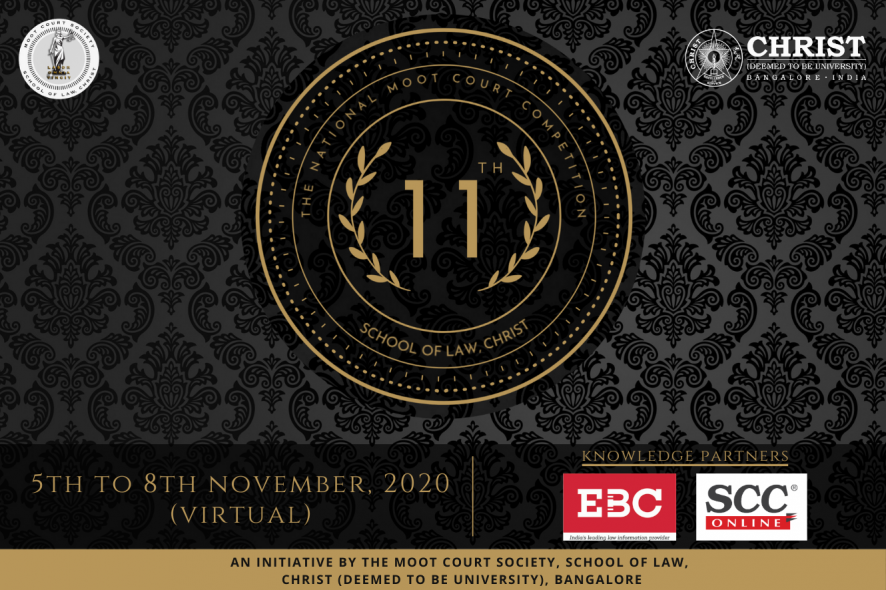Welcome to the 11th National Moot Court Competition organised by School of Law, Christ (Deemed to be University), Bangalore.
Our skills, enthusiasm, spirit, and passion for mooting remain unbound even during the pandemic. Thus, School of Law, Christ (Deemed to be University), Bangalore brings to you the most awaited event of the year, this time virtually, wherein teams representing the top universities participate from all over the country.
Over a decade, Christ (Deemed to be University) has earned the reputation of efficiently and successfully organising the National Moot Court Competitions involving the participation of the various legal luminaries bearing the capacity of judges for the rounds including Late Shri Ram Jethmalani, Sr. Advocate, Supreme Court of India, Hon’ble Mr. Justice Lavu Nageswara Rao, and Ms. Indira Jai Singh, Sr. Advocate, Supreme Court of India, who are not only experts in their respective fields but who firmly believe that proper guidance and sharing of wisdom makes a law student an even better lawyer.
“Tell me and I forget, teach me and I may remember, involve me and I learn.” ― Benjamin Franklin
The Moot Problem delves into the Centre-State relationship and taxation aspect, in line with the present scenario in India, providing the participants a platform to engage in intricate deliberations and discourse over constitutional law while improving their analytical skills, examining their advocacy skills, and broadening their knowledge horizon.
Everyone, mark your calendars from 5th November to 8th November and join us on our roller coaster journey. The Organising Committee and the Moot Court Society invite you to stay updated with all the events. Stay attached, remain updated, and may the best team win!
BRIEF ITINERARY OF THE EVENT:
Day 1: (5th November): Researcher’s test, Inauguration Ceremony, Preliminary Round 1.
Day 2: (6th November): Preliminary Round 2.
Day 3: (7th November): Octas, Quarter-Finals.
Day 4: (8th November): Semi-Final, Finals, Valedictory Ceremony.
DAY 4
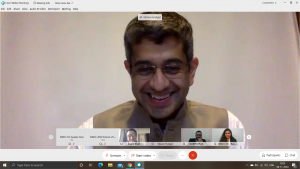
12:30 hours: The final day has begun. The four qualifying teams for Semi-finals will be adjudicated by:
Mr. P.M. Prabhakaran, who is an experienced Tax practitioner in the Tax Compliance Audit, Accounting & Legal advice, specializing in the areas of Service Tax and Value Added Tax and now working closely in the area of GST.
Mr. Vikram Huilgol, who is a Government Pleader at the High Court of Karnataka and has completed LL.M. from Harvard Law School in 2013 after graduating with an LLB degree from ILS PUNE in 2004.
Mr. Jayant Bhatt, who is an Independent Lawyer based out of New Delhi, India, holds an LL.M. from New York University, USA & National University of Singapore and is a member of the prestigious Supreme Court Bar Association and Delhi High Court Bar Association.
Mr.Narendran Manoharan, who is Partner at King & Partridge, Chennai, has completed his law degree from Dr. Ambedkar Law University School of Excellence in Law, Tamil Nadu and has been associated with King & Partridge since 2013.
CH 1
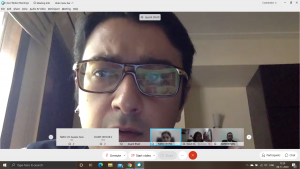
12:44 hours: Semi-final round commences.
12:45 hours: Petitioner Speaker 1 states the case K.C. Gorvati v. Union of India and starts her argument.
12:50 hours: Judge M. Narendran questions Petitioner Speaker 1 on the object of the Disaster Management Act. Petitioner Speaker 1 mentions Section 38 of the Act and answers the question accordingly.
12:55 hours: Petitioner Speaker 1 cites the case K.S. Puttaswamy v. Union of India and relates it to the case at hand. Judge M. Narendran asks Petitioner Speaker 1 to mention the paragraph of the judgment that Petitioner Speaker 1 is referring to.
13:00 hours: Judge M. Narendran questions Petitioner Speaker 1 what ingredients are required to state the unconstitutionality of Article 279(a) of the Constitution. Petitioner Speaker 1 answers the question by explaining the basic structure.
13:05 hours: Petitioner Speaker 1 states that the principle of federalism is violated. Judge M. Narendran questions Petitioner Speaker 1 on the decision that was finally given by the GST Council. Petitioner Speaker 1 answers the same by giving an alternative contention.
13:10 hours: Judge M. Narendran questions Petitioner Speaker 1 whether the recommendation is binding if the states ratify it. Petitioner Speaker 1 mentions that there is no such direction that states whether the recommendations would be binding or not if the states ratify.
13:15 hours: Petitioner Speaker 2 draws the attention to the third GST council meeting.
13:24 hours: Judges disagree with the contention given by the Petitioner Speaker 2. Petitioner Speaker 2 argues by stating the provision of the GST Council.
13:28 hours: Judge M. Narendran states that the policy issue cannot be argued in court. In response, Petitioner Speaker 2 argues that it is not a policy issue alone.
13:31 hours: Judge M. Narendran disagrees with the argument of Petitioner Speaker 2 and asks Petitioner Speaker 2 to proceed with the next issue.
13:53 hours: Judge M. Narendran asks Respondent Speaker 1 to provide a summary of the arguments. Respondent Speaker 1 summaries his arguments and states Article 257 of the Constitution
14:01 hours: Judge M. Narendran questions Respondent Speaker 1 about what restrictions were given by the NEA. In response, Respondent Speaker 1 refers to paragraph 15 of the written submission.
14:05 hours: Judge M. Narendran asks Respondent Speaker 1 on what basis the classification of the zones into red, orange, and green zones, has been made. Respondent Speaker 1 emphasises on Section 5 of the Disaster Management Act.
14:25 hours: Judge M. Narendran asks Respondent Speaker 2 if any item with regard to taxes in the Concurrent List. Respondent Speaker 2 points out that states have been given power and the GST council structure does not take any power of the states.
14:35 hours: Judge M. Narendran asks Respondent Speaker 2 whether the states have the power to make their own taxes where the autonomy of the States is. Respondent Speaker 2 answers the question by stating the sole purpose of implementing GST taxation.
14:46 hours: The round has come to end. Scoring begins.
CH 2
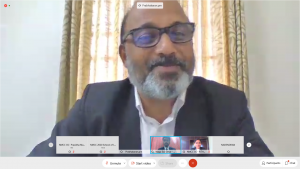
12:38 hours: Semi-Final round commences.
12:39 hours: The Judge asks a question on the validity of provision under Article 131. The Petitioner Speaker 1 answers by citing the example of CAA. It was argued by the counsel that amongst the articles inserted, the petitioners are challenging the constitutional validity of Article 279A and the authority of the GST Council.
12:53 hours: Judge Vikram seeks clarifications from the counsel whether an order of advice passed by the court on the actions of the Centre would suffice. The Counsel agrees to the same stating that this wouldn’t require the quashing of Article 279A of the 101st Amendment.
12:55 hours: The counsel further argues that the state of Chalukya and the other states opposed the Centre’s option to borrow from Union bank as principal borrowers. Vikram sir requests the exact pointer from the moot proposition. The same was satisfactorily pointed out by Petitioner Speaker 1.
13:00 hours: Petitioner Speaker 1 then moves on to the next issue. The counsel argues the confusion raised by the ‘recommendations’ given by the GST Council and the binding nature of their directory order. The counsel submitted that the Centre should adhere to its obligations.
13:02 hours: Judge Prabhakaran askes a question regarding the exact provision that grants Constitutional obligation to the Centre. The counsel brings Article 279A to the attention of the bench. The counsel clarifies Section 10 that states cess fund and that the states will derive this cess from the collection made by the Centre under GST.
13:06 hours: The counsel cites the cases of R.D. Shetty v. International Airport of India and Lucknow Development Authority v. UOI to substantiate his contentions. Judge Prabhakaran asks the jurisdiction, under which the matter will come in the state of a pandemic. The Counsel replies to the same as ‘Centre’. The Counsel states that the public raised objections for the shut down of the economic activities, but NEA rejected it without any justifications.
13:08 hours: Judge Prabhakaran asks about the Intelligible Differentia in the proposed matter as per Article 14 of the Constitution rejected it without any justifications. Prabhakaran Sir asks about the Intelligible Differentia in the proposed matter as per Article 14 of the Constitution.
13:08 hours: Judge Vikram points to the unprecedented health emergency and thus, the significant cooperation and authority for the opening of places. The Judge states that “Article 19 has its limitations”.
13: 10 hours: Judge Vikram clarifies that the judiciary does not have the authority to open or shut down village A and village B and whether Petitioner Speaker 2 will take responsibility for the death of lives due to the disease later on. The counsel states a rational nexus i.e. intelligible differentia to be incorporated in the policy decisions of the centre.
13:24 hours: Judge Vikram asks about the state’s responsibility for the opening of the economy during a pandemic as under the State list. The Respondent Speaker 1 replies by substantiating their arguments with UCO Bank and anr. and State of Kerala v. Union of India.
13:37 hours: Judge Prabhakaran asks whether the states should just keep quiet if the Centre imposes something that injures their interests. The counsel replies to the same by stating that if something like this is not complied with, then it’ll affect the ethos of cooperative federalism.
13: 47 hours: Prabhakaran Sir intervenes to cite the previous tax regime where the tax share of the state was collected by themselves and even now the share sought by them is theirs, just collected by the Centre.
13: 50 hours: Judge Vikram asks humorously whether it’s valid to “dirty someone else’s house to save their own”. The counsel argues that according to the voting pattern of the GST Council, considerable attention should have been given before passing the impugned orders and since the same wasn’t done, the actions are unconstitutionally invalid.
14:00 hours: Respondent Speaker moved onto prayer. This was followed by rebuttals by Petitioner Speaker 1.
14:05 hours: The Judges seemed satisfied with the rebuttals by both the teams.
14:12 hours: The round has come to an end.
15:58 hours: Final round commences.
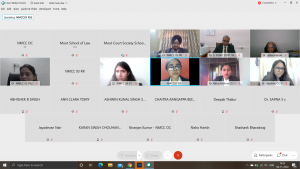
15:59 hours: Petitioner Speaker 1 cites K.C. Gajapati Narayana Deo v. The State Of Orissa, to substantiate that the orders are violative of fundamental rights enshrined under Constitution.
16:02 Hours: Petitioner Speaker 1 argues that the classification of red, green, and orange zones is reasonable, however, the exercise of power was arbitrary. Petitioner Speaker 1 raised the concern that the areas which had no active cases, were declared as red zones. Thus, the purpose of the classification was defeated.
16: 05 Hours: Justice Sunil Dutt Yadav asks the petitioner to keep in mind the concept of Judicial Review. The Judge questions the counsel whether the action of the Government was arbitrary on account that the state had taken all measures possible it deemed fit for the public welfare to which the Petitioner Speaker 1 stated that the respondent should have only created containment zones in areas where there were active cases.
16:12 hours: Justice Sunil Dutt Yadav states that abuse of power cannot be a ground to challenge constitutional validity and also under clause 11 questions the mechanism of where the particular concern is placed.
16:18 hours: Petitioner Speaker 1 mentions that recommendations of the GST council are binding on the Constitution Clause 4 of Article 279 A to substantiate her point.
16:19 hours: Petitioner Speaker 2 proceeds with issues 3 and 4.
16:24 hours: Petitioner Speaker 2 states that the act of the central govt is against the mandate of GST compensation to states Act and the central govt has a moral obligation to compensate the states.
16:27 hours: Judge 1 questions Petitioner Speaker how it is not unfair for the Centre to compensate the State especially when there is total lockdown and there is no contribution to advance the economy. Petitioner Speaker 2 emphasises that there is a legal obligation on the centre to compensate the funds for the state, and the Centre can reasonably compensate through cess.
16:32 hours: The Petitioner Speaker 2 proceeds to the prayer.
16:35 hours: Respondent Speaker 2 proceeds to deal with issues 2 and 3.
16:37 hours: Respondent Speaker 2 cites the case of Lakshmi Narayan v. Union of India.
16:41 hours: Respondent Speaker 2 cites Manohar Singh v. State of Maharashtra and S.R. Bommai v. Union of India for substantiating strong Centre, flexible federalism and cooperation.
16:42 hours: Respondent Speaker 2 states that recommendation has to be read as per Literal as well as Golden rule of interpretation.
16:44 hours: Justice Sunil Dutt Yadav questions as to why there is a dispute redressal mechanism. Respondent Speaker 2 states that the body was created to just debate and deliberate and the creation of an adjudicatory body will derive better results.
16:50 hours: Respondent Speaker 1 proceeds with issues 1 and 4.
16:58 hours: Justice Sunil Dutt Yadav questions Respondent Speaker 1 and refers to the para (f ) of the moot proposition that states that the residuary power rests with the State. The speaker refers to constituent assembly debates and states that the Disaster Management Act was borne out of the exercise of residuary power and thus doesn’t violate any Union ethos.
17:00 hours: Respondent Speaker 1 states that the insertion of paragraphs go beyond the scope of the State Legislature and refers to the case: Syed Habibullah v. State of West Bengal.
17:02 hours: Judge asks insertion in the speech is in the nature of proceedings in virtue of Article 212. Respondent Speaker 1 answers affirmatively and concludes with her arguments.
17:04 hours: Scoring Begins.
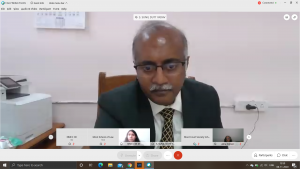
17:11 hours: Hon’ble Mr. Justice S. Sunil Dutt Yadav, Judge, High Court of Karnataka, addresses the participants by stating that covid is a blessing in disguise as geographical borders are diminished. Moot court system instills discipline, time management, research skills, presentation skills and confidence in the young aspiring lawyers while responding to queries raised by judges. Justice Yadav, further, appreciated the participating teams.
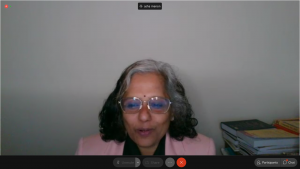
17:16 hours: Hon’ble Ms. Justice Asha Menon, Judge, High Court of Delhi, complimented the mooting society. In courts, there are no boundaries. Litigation is becoming more attractive to women and Justice Menon states that she was glad to see that litigation seems appealing to young women. Justice Menon further mentions that the virtual court gives abundant opportunities to youngsters who always manage to cheer her up even when times are bad.
17:32 hours: Valedictory ceremony for the 11th National Moot Court Competition, School of Law, CHRIST commences.
17:35 hours: The Ceremony began with auspicious digital lighting of the lamp along with an invocation song.
17:37 hours: Dr. Sapna S, Head of Department, School of Law, Christ University welcomes the Hon’ble Guests on behalf of School of law, Christ University and introduces them to the audience. She acknowledges that 35 Teams battled against each other to qualify for the final round, and amongst them, the deserving teams reached the Finals.
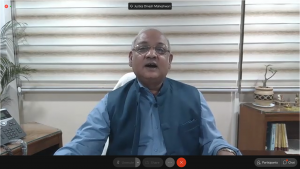
17:45 hours: Hon’ble Mr. Justice Dinesh Maheshwari, Judge, Supreme Court of India, Chief Guest for the 11th National Moot Court Competition, School of Law, CHRIST mentions that everyone is getting used to the new normal of meeting everyone virtually. Constitution of India is not only a study of only text or letter but also a study of ideals, morals we live by and continue to live by. Roots consist of smaller filaments and each one of the filaments is important, we ourselves are the filaments. The weakness of a single filament can lead to the weakening of the tree itself. Our Constitution is considered as an organic document and each one of us has the duty to live by it. Young brain in the days to come will be nurturing the laws and constitution to serve the society. Justice Maheshwari emphasizes that understanding Centre-State relations cannot be complete by merely studying any one provision but rather one needs to study an amalgamation of provisions to truly understand Centre-State relations.
18:14 hours: Dr. Fr. Benny Thomas, Director, School of Law, Christ (Deemed to be University) addresses the audience and mentions that School of Law, CHRIST has been successful in all its academic endeavors without fail.
Now is the time to declare the winners of the 11th Edition of National Moot Court Competition 2020. The Winners are:
Winner: Symbiosis Law School, Noida.
Runners up: National Law School of India University, Bhopal.
Best Researcher: Ishita Goyal, Symbiosis Law School, Noida.
Best Speaker: Devanshi Tiwary, Symbiosis Law School, Noida.
Second Best Speaker: Nikhil Jalan, Government Law School, Mumbai.
Best Memorial: Gyanesh Tiwary, Aditi Banerjee, Rishabh Gupta- Chanakya National Law University, Patna.
Second Best Memorial: Aaditi Bose, Devanshi Tiwary, Ishita Goel- Symbiosis Law School, Noida.
DAY 3
14:45 hours: Day 3 has begun! Judges have been briefed. 16 teams have qualified and are preparing themselves for the Octa-finals.
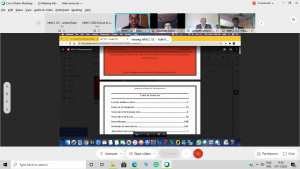
CH 1
15:15 hours: The session begins.

15:20 hours: Speaker states the provision of emergency in relation to the Disaster Management Act. Speaker moves with the theory of pith and substance.
15:25 hours: Petitioner Speaker 1 states the role of governors and concludes her arguments.
15:30 hours: Petitioner Speaker 2 takes over the remaining issues. He states the issue regarding the GST council. He cites the case Kesavananda Bharathi v. Union of India.
15:35 hours: He refers to State of Rajasthan v. Union of India and S. R. Bommai v. Union of India and relates the facts of the present case with the case laws.
15:45 hours: Petitioner Speaker 2 cites the case Purshottam Lal Sayal v. Prem Shanker’ and proceeds with the prayer.
15:50 hours: Respondent Speaker 1 states the doctrine of repugnancy and Article 355 of the Indian Constitution and Sections 8 and 72 of the Disaster Management Act are also referred.
15:55 hours: Judges interrupt Respondent Speaker 1 and Respondent Speaker 1 tries to answer the question and proceeds with her arguments.
14:05 hours: Respondent Speaker 2 cites the case of Prem Chand Jain v. RK Chhabra.
14:10 hours: Respondent Speaker 2 continues with her argument confidently and states that a pandemic is an Act of God.
14:20 hours: Petitioner Speaker 1 proceeds with the rebuttal and provides counter contentions to the arguments of respondents.
16:23 hours: Respondent Speaker 2 proceeds with the surrebuttal.
16:24 hours: The oral proceedings for the courtroom ends. Participants wait for judges’ feedback.
16:30 hours: Feedback is given and the court hall is adjourned.
CH 2
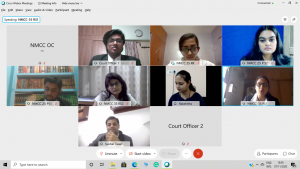
15:18 Hours: The session commences.
15:20 hours: Judge 1 states that the Supreme Court cannot interfere with the matter and questions the provision under which they are approaching the court. Petitioner Speaker 1 pleads ignorance.
15:22 hours: Petitioner Speaker 1 cites Anuradha Bhasin v. Union of India. Judge 1 replies that the Anuradha Bhasin case doesn’t apply to the case.
15:26 hours: Petitioner Speaker 1 cites the Puttaswamy case. Judge 1 questions Petitioner Speaker 1 to clarify whether the Puttaswamy case held by 2 judges or 9 judge bench is being referred. Petitioner Speaker 1 pleads ignorance.
15:29 hours: The judge asks Petitioner Speaker 1 to refer to Articles 256 and 13.
15:37 hours: Judge 1 asks Petitioner Speaker 2 whether Article 272A is being challenged to which Petitioner Speaker 2 replies negatively. Judge asks Petitioner Speaker 2 to refer to Article 246. Petitioner Speaker 2 answers all the questions but judge 1 was not satisfied with the answers.
15:47 hours: Judge 1 says that the council is approaching the wrong forum.
15:58 hours: Judge 1 asks Respondent Speaker 1 to refer to the State of Karnataka v. State of Tamilnadu.
16:00 hours: Judge 1 asks Respondent Speaker 1 where the word ‘constitutional morality’ is present in the constitution. Respondent Speaker 1 was not able to answer.
16:03 hours: Respondent Speaker 1 states about reasonable classification made under Article 14.
16:10 hours: Judge 1 questions Respondent Speaker 1 regarding the test for reasonable restriction, and Respondent Speaker 1 answers the same.
16:14 hours: Judge 1 asks Respondent Speaker 1 whether he was seeking negative prayer to which Respondent Speaker 1 replies that it was a typing error in the memo. Judge 1 says that the prayer is not maintainable.
16:38 hours: Petitioner Speaker 1 starts rebuttals.
16:43 hours: The scoring session has begun.
CH 3
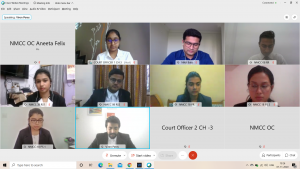
15:15 hours: Octa Final round commences.
15:18 hours: Judges ask Petitioner Speaker 1 about the facts of Kharak Singh v. State of UP.
15:19 hours: Judges question whether the scope of fundamental rights extends to the State as well.
15:21 hours: Petitioner Speaker 1 clarifies that they have approached under Article 32. The judge asks the speaker to support her claim with a case law as Fundamental Rights are only available to citizens.
15:22 hours: Petitioner Speaker 1 asks the judge to refer to Para 10 of their memorial. The Speaker then moves on to speak about the order and talks about Cooperative Federalism.
15:25 hours: Judge questions under which section of the DMA Act, have the petitioners approached the court.
15:29 hours: Judge asks if States were involved in passing the 101 Amendment.
15:30 hours: Petitioner Speaker 1 states that this act was passed under the 7th Schedule as it is taxation law. The judge informs that States also need to give their consent to pass taxation law.
15:51 hours: Judge asks the speaker to refer to Article 13(3) and states that resolutions passed by the State are legally binding as per Article 13.
15:53 hours: Petitioner Speaker 2 clarifies that these resolutions are not binding and mentions that it is a form of concern expressed by the state.
16:13 hours: Judge asks how GST recommendations are not binding on States.
16:14 hours: Respondent Speaker 1 asks the judge to refer to para 23 of their submission and cites Shein Gold Jewels v. State tax officer to clarify her point.
16:56 hours: Respondent Speaker 2 starts with surrebuttals.
17:00 hours: The scoring has begun.
CH 4
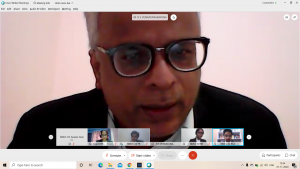
15:15 hours: Octa Final round commences.
15:25 hours: Petitioner Speaker 1 submits that GST was made to circumvent the provisions of Art 368 and further quotes Nani Palkhivala in Keshavananda Bharati regarding consequences involving consideration of power.
15:30 hours: Petitioner Speaker 1puts forward a power whether the GST contention is bound with ‘duty’. Petitioner Speaker 1 cites Section 18 of the 101st Amendment act and how it uses ‘parliament SHALL’ and other sections don’t.
15:45 hours: Petitioner Speaker 1 states that NEA must have made reasonable divisions of states in the matter of Slovid-19 and that contends the imposition of complete lockdown in an entire area is irrational as it treats equals as unequal.
16:05 hours: Judge asks the Respondent Speaker 1 if the State is being blamed. Respondent Speaker 1 replies that they need a collective effort and that he does not blame anyone and also mentions that the State takes into consideration Fundamental Rights in conjunction with DPSP.
16:53 hours: Respondents give surrebuttals.
16:00 hours: The scoring session has begun.
CH-5
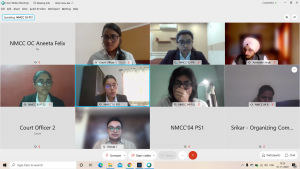
15:13 hours: Octa Final round Commences
15:16 hours: The judge questions Petitioner Speaker 1 under what statute this case has been filed to which Petitioner Speaker 1 answers by citing the case of State of Karnataka v. Union of India as an example.
15:20 hours: The judge questions if the orders were passed by the center’s executive capacity or legislative capacity which is answered by Petitioner Speaker 1.
15:26 hours: The judges ask Petitioner Speaker 1 whether the case should be dismissed as Petitioner Speaker 1. Petitioner Speaker 1 highlights that the entire statute is very vague in nature.
15:31 hours: Petitioner Speaker 1 is questioned on the applicability of Article 249 in this case and states that it only applies for legislative orders and not executive orders and Petitioner Speaker 1 gives an answer.
15:39 hours: Petitioner Speaker 2 is questioned by the judge if the assent of the states was taken or imposed during the implementation of the Act to which Petitioner Speaker 2 answers.
15:50 hours: The judge asks whether constitutional trust or obligation has been breached and states that this court does not deal with issues of constitutional trust. Petitioner Speaker 1 explains that the conditions given to the state under the Act were violated and constitutional trust was breached.
15:57 hours: Respondent Speaker 1 is questioned by the judges as to which provisions under the NDMA Act were the orders passed to which Respondent Speaker 1 answers.
16:00 hours: The judge asks Respondent Speaker 1 to analyse the provisions of the Act with respect to the Center’s orders. Respondent Speaker 1 highlights that this is an unprecedented situation and states that it is the duty of the government to do so to protect the Nation.
16:13 hours: Respondent Speaker 1 states that the Gst council was established so state recommendations can be considered.
16:21 hours: Respondent Speaker 2 is requested to clarify whether the decisions of the GST council are binding on the center and states which she responds in affirmative.
16:34 hours: Respondent Speaker 2 is asked if she has evidence to show that the Governor has been pressurised by the State Legislature to which Respondent Speaker 2 cites the scenario claiming it to be implied. The judges state that such implications will not be entertained.
16:45 hours: Scoring begins.
CH-6
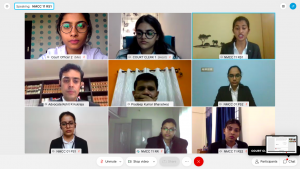
15:12 hours: Octa Final round Commences
15:17 hours: Petitioner Speaker 1 talks about Articles 19 1 (g) and 19 1 (d); states that the supreme court has widely interpreted Article 21.
15:22 hours: Judge asks if the pandemic comes under restrictions to Article 19 and if it is absolute; Petitioner Speaker 1 says it does not.
15:26 hours: Petitioner Speaker 1 states that the Bill is unclear because of its use of words; states that recommendations of the GST council should not be made binding.
15:39 hours: Judge questions whom the counsel is representing; Petitioner Speaker 2 says it is the State of Chalukya.
15:57 hours: Judge asks if pandemic can be stopped by stopping the trade; Respondent Speaker 1 answers that Article 21 must be upheld over other rights.
16:02 hours: Respondent Speaker 1 states the obligation on the Centre was to compensate losses caused due to GST and not due to the pandemic. The Judge asks as to why the Centre should not compensate; Respondent Speaker 1 states that the financial burden on the Centre would increase.
16:13 hours: Respondent Speaker 2 states that the centre has a commitment to compensation to compensate for losses arising out of GST only; talks about the doctrine of separation of power.
16:19 hours: Judge questions about the locus standi to file a writ petition and Respondent Speaker 2 substantiates with the writ of mandamus.
16:31 hours: Scoring begins.
CH-7
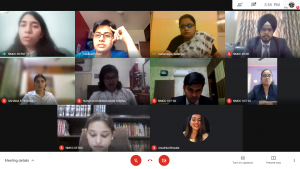
15:13 hours: Octa Final round Commences.
15:18 hours: The Petitioner Speaker 1 moves ahead with the contentions and arguments of issue 1. The judge asks a question relating to the state’s authority to legislate an enactment during a health emergency.
15:35 hours: Petitioner Speaker 2 further argues that the Centre must make the GST compensation under the principle of promissory estoppel.
15:40 hours: The judge asks under what authority of Law have the resolutions been passed by the State Government. The speaker responds with certain factual arguments and moves ahead with the prayer.
15:50 hours: Respondent Speaker 1 begins her arguments by stating that the orders are constitutionally valid as it is a reasonable restriction on the fundamental rights. The judge asks a question on what grounds and authority the orders have been passed.
16:05 hours: The judge questions the Respondent Speaker as to whether a speech can be held unconstitutional. In response to this question, the Counsel cites the Syed Abdul case.
16:20 hours: The petitioners rebut the arguments of the respondents.
16:30 hours: The respondents have started with the surrebuttal.
16:34 hours: Rounds completed, scoring begins.
CH-8
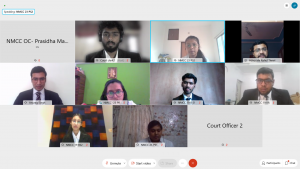
15:14 hours: Octa Final round Commences.
15:23 hours: Judge Rahul Tiwari questions whether the State have the authority or binding recommendation.
15:42 hours: Judge Rahul Tiwari has asked the judgment of Union of India v. Mohit Minerals to which Petitioner Speaker 2 has asked for 30 seconds to answer.
15:50 hours: Judge Anurag Singh asks the Respondents if Article 131 is the right jurisdiction to approach the Supreme Court.
15:53 hours: State list of public health stands null and void is stated by the Respondent Speaker 1. Respondent Speaker 1 has asked the judge to refer to page 17 of the compendium. The law should not be opposed by the union and the case, V Bannerjee v. Aneetha is stated.
16:00 hours: Respondent Speaker 1 states that Art. 19 and Art. 21 are intermingled but the Right to livelihood cannot be extended as in the case of MJ Shivani v. State of Karnataka.
16:05 hours: The judge Rahul Tiwari has asked if they have rejected the issues arbitrarily or do they have specific reasons.
16:13 hours: Respondent Speaker 2 argues Centre should be given more power to have a unified decision for the State of Meluha.
16:20 hours: Preamble of the GST act and compensation to the state is cited. The revenue deficit arriving out of Slovid is not considered in this present case as stated by Respondent Speaker 2.
16:30 hours: Judge questions why issue 3 is being addressed by the respondents and the respondent proceeds to the prayer that the state should be the sole borrower.
16:38 hours: Scoring begins.
18:15 hours: Judges briefing is done. Teams are proceeding with the Quarter-Final rounds.
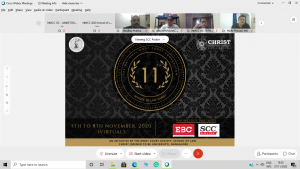
CH 1
18:36 hours: Quarterfinal round commences.
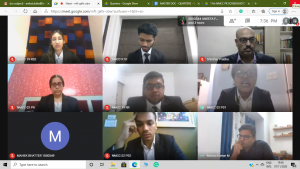
18:37 hours: Petitioner speaker 1 states Art 131 for the statement of jurisdiction. Judges interrupt Petitioner Speaker 1 and ask to give a statement of facts.
18:40 hours: Petitioner Speaker 1 cites Section 10 and 11 of NEA, there needs to be certain guidelines and stated that the State has the primary responsibility.
18:48 hours: A series of arguments take place between the Petitioner Speaker 1 and the Judges regarding 101st Amendment.
19:00 hours: Petitioner Speaker 1 states that a State’s autonomy is being taken away by the Centre. Judge questions Petitioner Speaker 1 why he waited all this while to raise this issue. Petitioner Speaker 1 says that the State was against the tax regime and it was apprehensive about it.
19:05 hours: Judge asks how the implementation of GST is constitutionally invalid because it only gives a percentage of tax to be levied. Petitioner Speaker 1 points out to a clause in response.
19:10 hours: Judge questions how the decision of the Centre which is making States borrow, is unfair. Petitioner Speaker 1 accidentally states that it is a force majeure situation. Judge warns Petitioner Speaker 1 and says that the question is of the ‘principal borrower’.
19:15 hours: A series of arguments take place between Petitioner Speaker 1 and judge based on fiscal management principles. Judge asks Petitioner Speaker 1 to point out the provision which states that itis violative. Petitioner Speaker 1 responds by stating that Purushottam Lal v. Prem Shanker contradicts a particular provision.
19:35 hours: Petitioner Speaker 1 cites Article 29 which specifies the prevention of infectious diseases and emphasizes on the word ‘public’ and how it has a wide interpretation.
19:45 hours: Judge asks under what jurisdiction the Petitioner Speaker 1 approached the bench. Petitioner Speaker 1 responds to the same stating Article 131.
19:50 hours: Judge asks if the word ‘federal’ comes under Article 131. Petitioner Speaker 1 says that the ‘gravity’ of the issue directed her to choose Article 131 and that because it was a petition between state and centre.
19:55 hours: Judge questions the prayer of the Petitioner Speaker 1 as to which writ must be exercised to say that the governor’s speech was wrong/right. Petitioner Speaker 1 remains silent and apologizes.
19:57 hours: Judge asks Petitioner Speaker 1 if he should remove the governor for his act or what the counsel suggests as punishment because what has been said cannot be undone. Petitioner Speaker 1 responds that when the rule of law is questioned, the law prevails no matter what. Judge states that Petitioner Speaker 1 has given an argument in favour of the respondent.
20:20 hours: Judges ask Respondent Speaker 1 if ‘public health’ is his domain and if its scope is decided. Respondent Speaker 2 answers unsatisfactorily. The judge counter questions such a provision is mentioned. Section 6(2)(i) of NDMA is pointed out by Respondent Speaker 2. Judges say that it is a ‘responsibility’ not an ‘obligation’ of the Centre.
20:30 hours: Judge asks Respondent Speaker 1 if anyone can constitutionally take up action on the governor’s speech. Respondent Speaker 1 responds in the affirmative. The judge seems surprised with the response and Respondent Speaker 1 cites Dr. Roy who filed such a case.
20:50 hours: Judge asks Respondent Speaker 1 if states can borrow from another nation. Respondent Speaker 1 replies that the states have not proposed such a thing but when it does, they would deal with it.
20:55 hours: Judges ask if the states can loan money from the centre. The Respondent Speaker 1 replies affirmatively.
21:00 hours: Petitioner Speaker 1 proceeds with the rebuttals.
21:04 hours: Respondent Speakers moves on to the surrebuttal.
21:07 hours: The scoring session begins.
CH 2
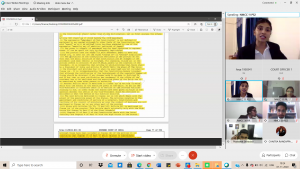
18:47 hours: Quarterfinal round commences.
18:50 hours: Petitioner Speaker 1 begins with issue 1. Petitioner Speaker 1 defines the term Constitutionality and provides the jurisdiction and validity of Article 131. Petitioner Speaker 1 cites the case of Narendra Kumar v. Union of India.
18:53 hours: Petitioner Speaker 1 states that the restrictions passed due to Slovid-19 are unreasonable and the Right to Life has been violated.
18:59 hours: Petitioner Speaker 1 states that public health and sanitation is a matter that comes under the powers of the State. The Judge asks questions to clarify the same and Petitioner Speaker 1 answers that an extended lockdown is not necessary and the State has done a good job in controlling the pandemic.
19:02 hours: The Judge questions Petitioner Speaker 1 whether the order is under the Disaster Management Act or Epidemic Diseases Act and what the scheme of the Disaster Management Act is. Petitioner Speaker 1 responds to the question.
19:13 hours: Judge asks Petitioner Speaker 1 how the onus falls on the State and Petitioner Speaker 1 answers that States cannot borrow loan from the Reserve Bank of Meluha.
19:15 hours: Petitioner Speaker 1 mentions Article 279 (4). The Judge asks whether the constitution of the GST council includes State minister and Union ministers and on the voting procedure of the same. Petitioner Speaker 1 states that the Centre can exercise its own veto power and levy service tax and customs tax and infringing the state’s fiscal economy.
19:24 hours: Petitioner Speaker 2 cites the case of Kesavananda Bharathi v. UOI. The Judge asks to read Section 18 and asks questions on the same. The Judge also mentions that there is no obligation for the state but Petitioner Speaker 2 clarifies the same through further reading.
19:33 hours: Petitioner Speaker 2 states the Doctrine of Separation of Power and cites the case of SB Sambad Kumar v. UOI.
19:36 hours: Petitioner Speaker 2 proceeds to the 4th contention. Petitioner Speaker 2 cites the case of Tejkiran Jayan v. N Sanjeev Reddy.
19:47 hours: The Judge questions Respondent speaker 1 about the compensation issue and Respondent Speaker 1 answers the same.
19:50 hours: The Judge questions Respondent Speaker 1 whether the States have a limitation on borrowing loans for various purposes. Respondent Speaker 1 answers the question regarding the problems in borrowing money in such a way so that they bring it to the notice of the GST council.
20:00 hours: Judge asks Respondent Speaker 1 whether one can claim the Act of God and Respondent Speaker 1 replies that this was done in the best interest of the whole country.
20:04 hours: Judge questions Respondent Speaker 1 whether there is a force majeure clause involved in the present case and Respondent Speaker 1 responds no.
20:10 hours: Respondent Speaker 1 concludes his arguments and Respondent Speaker 2 proceeds with his arguments.
20:15 hours: The Judge asks Respondent Speaker 2 how the Disaster Management Act is more convenient than the Epidemic Diseases Act to which Respondent Speaker 2 answers that it is not.
20:24 hours: The Judge asks Respondent Speaker 2 if an executive authority could curtail freedom to which Respondent Speaker 2 answers by citing Khoday Distilleries and Ors v. State of Karnataka.
20:29 hours: Respondent Speaker 2 proceeds with the prayer stating that the relief should not be granted.
20:32 hours: Petitioner Speaker 2 moves on to the rebuttal.
20:41 hours: The scoring sessions commence.
CH 3
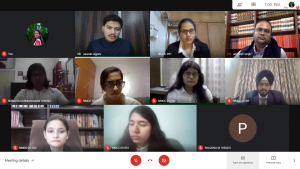
18:46 hours: Quarterfinal round commences.
18:49 hours: Judge Saunak Asks why 9 judge bench has been constituted today. Judge also asks why a nine-judge bench would be constituted in the first place. Petitioner Speaker 1 falters with the answer.
18:52 hours: Judge Saunak asks for 3 facts that are in favour of petitioners from the statement of facts.
18:55 hours: Judge asks under what situation, can the State file a suit. Petitioner Speaker 1 says that powers of the State cannot be encroached upon.
18:58 hours: Judge Saunak asks for justification under Article 248. Petitioner Speaker 1 is not able to answer.
19:05 hours: Judge Saunak asks how people’s rights are violated under art. 14. Petitioner Speaker 1 pleads that putting one section of society under economic restraint is arbitrary.
19:10 hours: The court seeks clarity in quashing the order. Petition Speaker 1 enlightens on the same. The judge gives 3 mins extension of time.
19:15 hours: Judge Animesh says that approaching the court under section 14 being violated is not clear to him.
19:20 hours: Saunak asks what 4 measures that the state undertook for the lockdown. Petitioner Speaker 1 answers. Petitioner Speaker 1 contends the Right to livelihood has been affected.
19:25 hours: Petitioner Speaker 1 quotes the case of Olga Tellis in order to explain the right to livelihood. Petitioner Speaker 1 later pleads that the disaster management act does not have the right mechanism. The judge tells the counsel not to mislead the bench with her arguments.
19:35 hours: Counsel starts with issue 3 – constitutional validity of article 279A. Judge Saunak questions why 4 years have been waited before challenging the same.
19:40 hours: Judge Saunak asks the difference between cooperative and quasi federalism. Counsel is not able to give examples.
19:45 hours: Judge asks what provision of the constitution is being violated in the instance. Counsel quotes the case of Keshavananda Bharati.
19:50 hours: The judge asks a question related to Schedule 7 of the constitution. Counsel has given an example related to the same.
19:55 hours: Counsel proceeds to argue that the GST council has not followed due procedure.
19:55 hours: Counsel proceeds to argue that the GST council has not followed due procedure. Counsel has not completed sufficient portions of the argument, the judge granted 4 mins extra time.
20:00 hours: Judge Saunak questions regarding the recommendation and the binding nature. Counsel still argues that the recommendations are in fact binding in nature. The judge rejects this argument.
20:05 hours: The judge asks why the Union will compensate for the losses. Counsel quotes section 7 of the GST Act to substantiate that the Union should compensate 17,000 crores.
20:10 hours: Judge Saunak asks if petitioners can represent the governor of the State. Petitioner Speaker 2 desperately tries to complete her arguments. Time has been exceeded.
20:15 hours: Finally respondents have started. Counsel submits that NDA has the authority to pass the orders and refers to the Disaster Act for elaboration.
20:25 hours: Judge Animesh asks under what provision can that Centre give an order applicable to all the states. Counsel answers effectively. Judge Saunak asks a question regarding the State and Centre veto power. Counsel answers effectively.
20:30 hours: Judge Saunak asks questions regarding cooperative federalism.
20:35 hours: Respondent Speaker 2 says that the promissory estoppel cannot override the specific constitutional provisions. Judge asks specifically which provision.
20:50 hours: Respondent Speaker 2 still holding onto D.C. Wadhva case to prove that there has been a violation of fundamental rights. Judge asks why this was not filed before the High Court.
21:05 hours: Rebuttals and sur-rebuttals are over. Proceeding for scoring.
CH 4
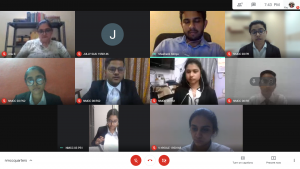
19:10 hours: Quarterfinal round commences.
19:15 hours: The Judge asks questions regarding the facts of the case. Petitioner Speaker 1 answers the question. A series of questions and counter questions takes place.
19:20 hours: Petitioner Speaker 1 asks the judges to refer to Para N of the memorial.
19:45 hours: The Petition Speaker 2 moves on to his next contention. The judge questions the speaker regarding the doctrine of colorable legislation.
19:50 hours: The Judge also questions Petitioner Speaker 2’s reason to approach the court and locus standi of the present case.
19:55 hours: Petition Speaker 1 was about to go to the second contention but the Judge asked him a question based on cooperative federalism. The speaker does not seem confident and is stuck in a series of questions asked by the Judges. Petitioner Speaker 1 proceeds with the fourth issue.
20:00 hours: Petitioner Speaker 1 concludes her arguments. Petitioner Speaker 2 takes over the remaining issues. Petitioner Speaker 2 requests the Judges to refer to Page 6 of the memorial.
20:05 hours: Petitioner Speaker 2 places reliance on Article 246 A and cites S.R. Bommai v. Union of India.
20:10 hours: The Judge asks Petitioner Speaker 2 to give an alternative for the issues stated. Petitioner Speaker 2 begins with the third argument and refers to the precedent Harishankar v. Union of India.
20:30 hours: Respondent Speaker 1 refers to para 6 of the memorial and states Article 248 of the Act.
21:10 hours: Respondent Speaker 2 refers to Schedule 7 of the said Act. The Judge questions Respondent Speaker 2 regarding Social Contract. Respondent Speaker 2 explains that the Centre as well as the State has a relation of Social Contract.
21:25 hours: Petition Speaker 1 begins with the rebuttal.
21:28 hours: Respondent Speaker 2 takers over rebuttals.
21:35 hours: Scoring begins.
22:10 hours: Day 3 has successfully come to an end. The teams qualifying for the semi-finals have been revealed. Join us for the semi-finals and finals tomorrow!
DAY 2
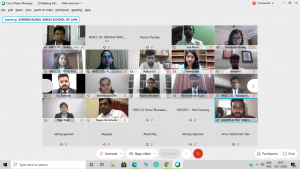
17:30 hours: The events of day 2 have begun. Judges have been briefed and 35 teams are ready for preliminary rounds 2. The teams with great zeal are proceeding towards their 2nd round. May the most deserving teams qualify for Octa-finals!
CH-1
17:41 hours: Preliminary round has commenced.
17:46 hours: Petitioner Speaker 1 mentions the case law of Godfrey Phillips India Ltd. v. State of U.P.
17: 53 hours: The judge has questioned Petitioner Speaker 1 if the value of the case of the Supreme Court Of India is binding in the Supreme Court of Meluha. The speaker responds that it is.
18:19 Hours: The Judge has asked the Respondent Speaker if he thinks that the Central government did injustice by not financing the State of Meluha. The speaker responds that as there is no mention of such a thing in the facts of the case, he would like not to answer the question.
18:21 hours: The Respondent Speaker 1 quotes the fundamental legal principle, “Necessity knows no law”.
19: 02 hours: The round is over and the Court Hall has been adjourned.
CH-2
17:35 hours: Preliminary round has commenced.
18:06 hours: The judge asks Petitioner Speaker 1 that if the State gets no money from the Centre then how will it take care of its people and hence it is a constitutional violation to which Petitioner Speaker gives her answer.
18:11 hours: The judge asks if the State of Chalukya is separate from the Country of Meluha to which Petitioner Speaker 1 responds that Article 14 is being violated due to various reasons.
18:42 hours: Respondent Speaker 1 states Section 2(d) of the NDMA Act to which the judge asks Petitioner Speaker 2 to explain why SLOVID-19 is a natural disaster.
19:31 hours: The oral session has concluded.
CH-3
17:35 hours: Preliminary round 2 has commenced.
18:00 Hours: Judge 2 asks whether it means the Centre should compensate the states for the losses incurred by the pandemic. Petitioner Speaker 1 answers the question.
18:27 hours: Judge 2 asks whether voting power is discriminatory to which Respondent Speaker 1 replies it’s not discriminatory.
19:05 Hours: Judge 2 questions Respondent Speaker 2 if the GST Council is constitutional then how can judicial review be restricted. Respondent Speaker 2 answers the question by quoting M.P. Oil Extraction v. State of Madhya Pradesh.
19:18 hours: Before rebuttal started, Judge 1 asks whether Petitioner Speaker 1 is arguing that the Disaster Management Act can take over the constitution. Petitioner Speaker 1 replies that since it is made for a very specific purpose, the Disaster Management Act would take over the Constitution.
19: 21 hours: Petitioner Speaker 1 briefly explains the term ‘resolution’ to substantiate that the Centre’s claim about resolution is incorrect.
20:00 hours: The round has come to an end.
CH-4
17:50 hours: Preliminary round 2 has commenced.
17:55 hours: Judge 1 questions Petitioner Speaker 1 as to why the orders have to be terminated under Article 13 of the Constitution. Petitioner Speaker 1 answers the questions by referring to Article 19 and Article 21 to prove that the orders are arbitrary and constitutionally invalid.
18:00 hours: Judge 2 questions Petitioner Speaker 2 for challenging the constitutionality and validity of the legislation, and whether these contractual questions are put forth in the right forum. Petitioner Speaker 2 answers the question.
18:04 hours: Petitioner Speaker 2 quotes Section 101 of the Indian Evidence Act and says that the respondents have failed to prove that the losses were a result of an Act of God. Petitioner Speaker 2 quotes Rangammal v. Kuppuswamy. Petitioner Speaker 2 asserts that the losses were caused due to the restrictions imposed by the Centre and not because of the Slovid-19 Pandemic.
19:25 hours: The round has come to an end.
CH-5
17:54 hours: Preliminary round 2 has commenced.
18:00 hours: The Judge asks a question on the emergency matrix of the situation provided in the moot proposition. The same was answered by the Petitioner Speaker 1. Deliberations on the ultra vires nature of the executive and legislature were made between the judge and the Petitioner Speaker 1.
18:10 Hours: The judges questioned regarding the validity of health matters coming under State lists under the Constitution of India. The Petitioner Speaker 1 submitted that the maintainability of the case of Dr. Sioban Roy doesn’t stand since Mr. Roy had approached the court under Article 32 of the Constitution while there has been no violation of Fundamental Rights.
18:20 hours: The judges asked for the definition of cooperative federalism in the constitution. The Petitioner Speaker 2 replied that it isn’t stated in verbatim but the same can be deduced from the interpretation of voting rights of the Centre and State, under Article 9 of the Constitution.
18:35 hours: The Respondent speaker 1 started with their side of the arguments and presented the compendium on the meet. Respondent speaker 1 cited several relevant sections of Disaster Management Act, 2005.
18:45 hours: The judge asked a question on the proportionality of the orders with the stance of the petitioners. Respondent speaker 1 answered that the contentions of the petitioners were unfounded based on para P of the fact sheet.
19:33 hours: The round has come to an end.
CH-6
17:47 hours: Preliminary round 2 has commenced.
18:00 hours: Judge requests Petitioner Speaker 2 to substantiate her contention on the violation of Constitutional Principles. Petitioner Speaker 2 cites two cases in her answer.
18:01 hours: Judge questions the principle found in Kesavananda Bharati case. Petitioner Speaker 2 satisfactorily answers by stating the concept of Federalism.
18:30 hours: Judges question whether NMDA can supersede the Constitution as its orders have infringed constitutional provisions. Respondent Speaker 1 responds with a provision of the NDMA.
18:35 hours: Respondent Speaker 2 states Section 4(1) of FRDM which provides that the debts for Centre and State are 40% and 60% respectively. Respondent Speaker 2 thus contends that additional borrowing by states would dry up the funds of the centre. It is stated that federalism of the Constitution is not observed only through taxation, but also through the three lists and distribution of powers between the judiciary and legislature.
19:33 hours: The round has come to an end.
CH-7
17:30 hours: The Preliminary Round 2 Commences.
17:35 hours: Petitioner Speaker 1 proceeds with the contentions. The petitioner states the facts of the case.
17:45 Hours: The judge asks Petitioner Speaker 1 to correlate the facts of the case with the precedents cited.
17:50 Hours: The judge asks a question regarding the gravity of the central government. Petitioner Speaker 1 answers the question by highlighting Article 21 of the Indian Constitution. The speaker cites the Kesavananda Bharati case. Speaker 1 concludes the arguments of Issue 1.
17:55 Hours: The Judges ask the Petitioner Speaker 1 to establish whether the classification of states was unreasonable. Petitioner Speaker 1 cites Section 30 of the NDMA Act.
17:57 Hours: Judges correct Petitioner Speaker 1 saying it is ‘DMA Act’. Petitioner Speaker 1 tries to defend the answer by saying an amendment was made in 2005 through which it became NDMA.
18:10 Hours: Petitioner Speaker 2 states the Doctrine of separation of powers. She also cites the case of MP Samanth Kumar v. Union of India.
18:30 Hours: Petitioner Speaker 2 proceeds with the prayer.
18:45 Hours: Judge questions in relation to a paragraph of the memorial submitted by the respondents.
19:20 Hours: Petitioner Speaker 2 proceeds with the rebuttal and provides counter-arguments to the contentions of the respondents.
19:25 hours: No sur-rebuttal from the respondent side.
19:40 Hours: Feedback is being given.
CH-8
18:10 Hours: Preliminary Rounds 2 Commences.
18:37 Hours: The Judge questions why the centre has to compensate for the pandemic. The Petitioner Speaker 1 answers by reading out section 18 of the GST Act.
18:59 Hours: Judge 1 asks Respondent Speaker 1 why had the Centre not paid heed to the state’s contention. Respondent Speaker 1 argues that the Act and the orders passed by the centre is valid as it was made to protect the interests of the public and health.
19:17 Hours: Respondent Speaker 2 has approached the bench and has started mentioning her arguments regarding issues 2 and 3.
19:25 Hours: Judge 2 questions Respondent Speaker 2 regarding the GST council. The Respondent Speaker 2 pleads ignorance. The speaker quotes the case of S.R. Bommai v. Union of India.
19:39 Hours: Petitioner Speaker 2 has proceeded with the rebuttal. She brings to the attention of the court regarding the validity of the governor’s speech.
19:44 Hours: Scoring has begun.
20:00 hours: The round has concluded.
CH-9
17:51 Hours: Preliminary Rounds 2 Commences
17:55 Hours: Judges asks Petitioner Speaker 1 to point out a paragraph that states about intelligible differentia. Petitioner Speaker 1 points out the paragraph but the Judge interrupts the speaker and questions whether the red zones were free of Slovid patients.
17:58 Hours: Petitioner Speaker 1 points out that the National Disaster Act states that Centre needs to cooperate with the state.
18:25 Hours: Judges counter question if the States can pass a resolution without the consultation of the States. Petitioner Speaker 2 states that as per the undisputed facts, they can.
19:07 Hours: Judge asks the provision that prevents the State from borrowing money. Respondent Speaker states that the State isn’t in a position to borrow any more than this.
19:20 Hours: The Petitioner Speaker proceeds with rebuttals. Petitioner Speaker contends that Art. 279(a) loses its purpose if GST comes into the picture. Counsel further contends how force majeure is used in unforeseen circumstances and that this circumstance was one.
19:22 Hours: Respondents move onto surrebuttal and cite a case to nullify the purpose of the rebuttal.
19:33 Hours: Scoring Began.
19:40 Hours: The Rounds comes to an end.
CH-10
17:38 Hours: Preliminary Rounds 2 Commences
17:40 Hours: Petitioner Speaker 1 starts the arguments for issue no.1 by mentioning an observation of B. R Ambedkar, that the legislature and States are in no way dependent on the Centre: Centre and State are co-equal in this matter.
17:45 Hours: The judge asked Petitioner Speaker 1 why the Income Tax Act was issued.
17:47 Hours: The judge also asks the Speaker to substantiate its relevance with a case. Petitioner Speaker 1 cites a case to answer that.
17:57 Hours: Judges question the statement of borrowing and Petitioner Speaker 1 replies that the state can borrow.
17: 58 Hours: Judge isn’t pleased with the answer and replies that it isn’t a contract and that the obligation of the constitution should be fulfilled.
18:48 Hours: Respondent Speaker 1 exceeds the time so judges ask to conclude the statements. Judge questions if the GST committee falls under the purview of the Judicial Review.
18:49 Hours: Respondent Speaker 1 answers that it comes under the judicial purview as it is a constitutional body.
18:51 Hours: Respondent Speaker 1 argues about the validity of the NDA. Judge 2 asks who gave the power to establish the body. The speaker answers that the central government gave power.
19:03 Hours: Judge questions the jurisdiction under which the Petitioner Speaker approached the bench. Petitioner Speaker states that rights have been violated to which the Judge questions what rights have been violated.
19:04 Hours: Petitioner Speaker has no answer. Thus, the speaker pleads ignorance and requests to conclude the arguments.
19:12 Hours: Scoring began.
19:22 Hours: Feedback is being given. The round has come to an end.
CH-11
17:50 Hours: Round 2 commences.
17: 52 Hours: Petitioner Speaker 1 makes arguments regarding the unconstitutionality of the lockdown.
17:59 Hours: Petitioner Speaker 1 states that under Articles 131 and 32 of the Constitution, the court has the jurisdiction to try this case.
18:01 Hours: Petitioner Speaker 2 seeks permission to proceed with issues 3 and 4.
18:07 hours: Respondent Speaker 2 states that the legislative action of Chalukya and the Governor’s speech is constitutionally valid and requests the Hon’ble court to dismiss the petition.
18:37 hours: Judge asks Respondent Speaker 2 as to why the centre cannot borrow from the RBI and give compensations to the states. Speaker denies the burden of the Union as they are having a tough time dealing with Slovid.
19:03 hours: Scoring of the teams has begun.
19:25 hours: The round has come to an end.
CH-12
18:10 Hours: Round 2 commences.
18:20 Hours: The judges asked Petitioner Speaker 1 to state the facts of the case. Petitioner Speaker 1 mentions that he will be dealing with issues 1 and 3.
18:25 Hours: The judges questioned Petitioner Speaker 1 about the relation of Section 6 to Slovid-19. Petitioner Speaker 1 stated that the Union of Meluha has not consulted with the State under Section 11 of the Disaster Management Act.
18:50 Hours: Petitioner Speaker 2 has proceeded with the prayer.
18:52 Hours: Respondent Speaker 1 has approached the court and pleaded with the judges to start the issue. Respondent Speaker 1 has started with issue 1 which relates to the constitutional validity of both orders.
19:00 Hours: The judge questioned the classification of the red, green, and orange zones.
19:05 Hours: Respondent Speaker 1 answered that the Union has taken these measures to prevent further spreading of the virus to a large number of people.
19:30 Hours: Scoring began.
19:40 Hours: Rounds are over.
CH-13:
17:52 hours: Preliminary round 2 commences.
17:56 hours: The judge asked whether a particular point was made in the memorial or not.
17:57 hours: Respondent Speaker 1 is answering questions with help of the GST Council’s structure by using compendium.
18:04 hours: Respondent Speaker 1 talks about the harms of becoming a principal borrower.
18:14 hours: Respondent Speaker 2 mentions the maxim of “salus populi est suprema lex” to support their arguments. He asserts that the Constitution should not be questioned.
18:16 hours: The judge responds by saying that unilateral decisions can’t be taken at ground-levels as they don’t know what is happening there.
18:37 hours: The judge asks a question about the dispute resolution mechanism provided in 279A. Petitioner Speaker 1 answers the question with an example of veto power of Union with respect to the tax imposed on cigarettes.
18:56 hours: Judges questions about Act of God situation.
19:05 hours: End of Rounds.
CH-14:
18:28 hours: Preliminary round 2 commences.
18:31 hours: Speaker 1 proceeds with addressing issue 1.
18:35 hours: Petitioner Speaker 1 stresses on how “there is no mention of lockdown” in any provision of the Disaster Management Act.
18:45 hours: Petitioner Speaker 2 proceeds to argue upon the fact that decisions by the GST Council should not be binding on the central government and stated that Article 279 a is an abrogation to the skeleton of the Constitution.
18:55 hours: Petitioner Speaker 2 brings into light the case of S.R. Bommai v. Union of India and conveys that “States are not mere appendages of the country, they are equally supreme”.
19:02 hours: The Respondents start their arguments with Respondent 1 speaking on issue 1 and issue 4 pointing out that they tried to save lives with the initiative taken by the central government.
19:04 hours: Respondent Speaker 1 brings into light the case of – State of Rajasthan v. Union of India and states how Meluha isn’t just a federal country.
19:28 hours: Respondent Speaker 2 states that even though there isn’t any fault committed yet, they are compensating as they have a duty to care and try to broaden the definition of the extraordinary nature of Act of God.
19:45 hours: Scoring starts.
CH-15:
17:35 hours: Preliminary round 2 commences.
17:53 hours: The judge asked a question on the legislative policy relief and the Petitioner Speaker answered the question.
18:01 hours: Petitioner Speaker 2 has mentioned the cases of Kesavananda Bharati and S.R Bommai.
18:06 hours: Issue no. 2 has been completed and the judge requested the petitioner to analyze the issues and not merely read out from the memo.
18:16 hours: The judge questioned the speaker on Sections 18 and 19 of the Disaster Management Act. This was answered by the speaker.
18:29 hours: The judge questioned Respondent Speaker 1 on the excessive delegation of power, the existence of separation of power, and about absolute federalism. Respondent Speaker 1 struggled with the answer and concluded that the GST policy is one of the best policies.
18:42 hours: The judge has alerted Respondent Speaker 2 about the time left and has given her an extra 2 minutes.
19:04 hours: The scores are revealed and the judges are giving constructive feedback to the speakers.
19:14 hours: The round has come to an end.
CH-16:
17:50 hours: Preliminary round 2 commences.
17:58 hours: Petition Speaker 1 explains the break down of votes between the States and Union in decision making in the GST Council.
18:30 hours: Judge asks the Petitioner Speaker about Centre not taking up its obligations seriously; the speaker answers that the collections of the Centre have been strained due to the pandemic and that the Centre also has to take care of border and defense.
18:35 hours: Judge asks about where in the Act is the Centre given power to decide on the method of payment; the speaker pleads ignorance.
18:59 hours: Judge says that the contentions are arbitrary and that the Right to Livelihood has to be upheld; Respondent Speaker 2 explains Bentham’s theory of pain and pleasure; the judge asks if Bentham’s theory is given under the constitution and why the court must admit it.
19:06 hours: Judge asks if the State is a unitary government and if federalism is just an eyewash and questions whether imposing a blanket ban is right; Respondent Speaker 2 states that it isn’t a blanket ban and districts have the power to classify among themselves as red zones and green zones; judge asks if the State Governments can go against the Central orders and loosen up its orders and do the sub-classification on their own.
19:11 hours: Judge asks whether all sorts of judicial scrutiny must be cancelled and asks if the Supreme Court can’t do anything where expert bodies are constituted; Respondent Speaker 2 states that all fundamental rights must be balanced.
CH-17:
17:43 hours: Preliminary round 2 commences.
17:56 hours: Petition Speaker 1 proceeds with issue no. 1. Meanwhile the judge questions regarding the role of Article 136 while invoking this issue, and Petitioner Speaker 1 responds to it.
18:04 hours: Petitioner Speaker 1 proceeds with the same, where the judge further probes on the Disaster Management Act and Epidemic Act to this issue. Furthermore, she continues by stating the case Golkanth v. state of Punjab.
18:28 hours: Further, Respondent Speaker 1 proceeds with the first issue; the judge asks to elaborate on the excessive delegation of powers. Respondent Speaker 1 continues, by referring to Cooperation Building Association v. the State of A.P.
18:40 hours: Respondent Speaker 1 concludes with the 2nd issue, by pointing that Amendment has been forwarded to the legislative assembly, which has not been accepted by all the states.
18:45 hours: Respondent Speaker 2 began with his speech, stating that the Centre has accepted the liability. The judge questions the researcher about the GST council.
18:58 hours: Respondent Speaker 2 has concluded with his prayer. Both teams have proceeded with rebuttal followed by sur-rebuttal.
19:07 hours: Scoring begins.
CH-18:
17:47 hours: Preliminary round 2 commences.
17:49 hours: Judge asks Petitioner Speaker 1 on the absence of mentioning maintainability issue by the Petitioner.
17:50 hours: Apologies sought by the Petitioner Speaker 1.
18:05 hours: Judge opined that the reasonability to demarcate the zones in order to reduce the spread without violating any fundamental rights is against the argument of the Petition Speaker 1.
18:36 hours: The judge questions on freedom of speech and expression and parliamentary privileges of the State legislatures.
18:40 hours: The Respondent Speaker 1 stated that the basic structure doctrine was vaguely explained in Kesavananda Bharati case. Any change that can affect the basic structure of the constitution can be violated for which federalism is one of the most important aspects. Respondent Speaker 1, further states that this can be disruptive to the values of the constitution.
18:44 hours: The case, Narayan Das v. State of MP where the word prescription value was cited by Respondent Speaker 1.
19:03 hours: The round has come to an end.
20:15 hours: With that, Day 2 concludes successfully. The results for the teams qualifying for the Octas will be declared by 7 AM tomorrow. Stay updated with us and join us for our Day 3 events!
Day -1
10:59 hours: The Researcher’s test commences.
11:20 hours: The Researcher’s test has been successfully conducted and proctored. The Best Researcher would be awarded a Cash Prize of Rs. 5,000/-.
15:00 hours: SCC training session commences with Mr. Mohit Singh, senior trainer at SCC online, and Mr. Chetan Singh Gill, head trainer at SCC online as the Guest Speakers.
16:00 hours: The training session successfully comes to an end.
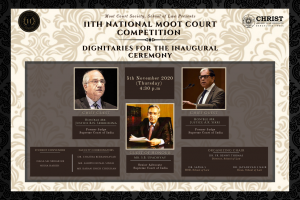
16:30 hours: Inaugural ceremony commences with the lighting of the Lamp along with an inaugural song.
16:43 hours: Dr. Fr. Jose CC, Pro Vice-Chancellor, Christ (Deemed to be) University addresses the gathering, commends the Moot Court Society for having conducted competitions successfully over the past ten years, and conveys his best wishes to all participants.
16:47 hours: Chief Guest, Hon’ble Mr. Justice B.N. Srikrishna, Former Judge of Supreme Court of India begins by explaining the advantages of moot court competitions and states that integrity is as much required as professionalism and how all lawyers are supposed to be social engineers keeping their eyes and ears open not only for the law but for what is happening in the society.
16:52 hours: Chief Guest, Hon’ble Mr. Justice A.K. Sikri, Former Judge of Supreme Court of India lightened the mood by going down the memory lane of his law school days where his teacher used to jokingly remark that “students are not here to study law but to find in-laws”. He elaborated on the role of moot court competitions in enhancing the oratory and drafting skills of an individual through memorial drafting and extensive research.
17:17 hours: Guest of Honour, Mr. S.B Upadhyay, Senior Advocate of Supreme Court of India, delved into the moot problem and threw light on the difference between federalism and cooperative federalism, the five ingredients to test the constitutional validity of any amendment: the supremacy of the Constitution, secularism, separation of power and sovereign democratic republic.
17:41 hours: Dr. Sapna S, Head of Department, School of Law, Christ University acknowledged the presence of Dr. Fr. Jose CC, Pro Vice-Chancellor, Christ (Deemed to be) University, Dr. Fr Benny Thomas, Director, School of Law, Christ University, the committee members, faculty and all the participants.
17:47 hours: Dr. Jaydevan S. Nair, Dean, School of Law, Christ University declared the 11th National Moot Court Competition Open and wished luck to all the participants.
17:48 hours: The inaugural ceremony successfully comes to an end.
CH-1
18:47 hours: Preliminary round commences.
19:06 hours: The Judge asks the speaker to elaborate on the value of the precedents in the Supreme court of Meluha. The speaker answered the question.
19:25 hours: The Judge asks the speaker to brief on the contract between the Central and the State government. The speaker answered the question.
20:06 hours: Petitioner Speaker 2 starts rebuttal.
20:09 hours: Respondent Speaker 2 starts sur-rebuttal.
20:28 hours: The round came to an end. Judges gave feedback.
CH-2
18:55 hours: Preliminary round commences.
19:01 hours: The judge requests Petitioner Speaker 1 to define an epidemic. Petitioner Speaker 1 is given counter questions on her answer. Petitioner Speaker 1 retracts her definition.
19:05 hours: The judge highlights that federalism is practiced differently in Meluha and the USA after hearing one of Petitioner Speaker 1’S arguments.
19:31 hours: The judge asked the difference between justice and equity.
19:32 hours: The judge clarifies the definition of equity.
19:36 hours: Respondent Speaker 2 is questioned on what is a national disaster according to the NDA. Respondent Speaker 1 then gives her an answer to which more counter questions are asked.
20:00 hours: The judge requests Respondent Speaker 2 to give economic reasons why the Center shouldn’t borrow the loan directly from the RBI.
20: 03 hours: Respondent Speaker 2 answers by stating the case of State of Rajasthan v. Union of India
20:06 hours: The petitioners have begun with their rebuttal.
20:08 hours: The round came to an end. Judges gave feedback.
CH-3
19:23 hours: Judge questions regarding whose fundamental right is violated. Petitioner Speaker 1 replies Meluha.
19:49 hours: Judge asks why the Act of God doesn’t apply here. Petitioner Speaker 2 replied.
19:49 hours: Judge questions whether the state can exercise extraordinary power and asks about colorable legislations. Petitioner Speaker 2 replied.
20:05 hours: The judge asks a question about separation of power. Respondent Speaker 2 answers.
20:52 hours: The round came to an end. Judges gave feedback.
CH-4
19:00 hours: Preliminary round commences.
19:13 hours: The judge asks whether the lockdown imposed was unconstitutional and asks Petitioner Speaker 1 to analyze the reasons for imposing the lockdown. Petitioner Speaker 1 answers the question.
19:25 hours: Judge 2 asks whether the Centre is bound to pay incidental costs. Petitioner Speaker 2 answers the question. Petitioner Speaker 2 asserts that the Covid-19 has proved to be beneficial for the State.
19:43 hours: Judge 2 questions Respondent Speaker 2 to which the speaker answers by saying that Art. 46 and Art. 48 give residual powers of the Parliament.
19:50 hours: Judge asks whether disease falls under Central list and which list does public health falls under.
19:50 hours: Respondent Speaker 1 answers the questions. Judge 2 asks as to the difference between a right and power. Respondent Speaker 1 is unable to answer, Judge 2 answers instead.
20:17 hours: Judge 1 states that the centre was incompetent to pay CGST even before the pandemic. Respondent Speaker 2 says that the Centre has given the option of paying compensation.
20:20 hours: Judge 1 asks as to how the Centre can ask the States to sustain on their own if the Centre itself has not provided CGST or any other compensation. Respondent Speaker 2 answers the question. Judge 2 asks Respondent Speaker 2 to not deviate from the topic and discuss the issue in itself.
21:10 hours: The round came to an end.
CH-5
18:55 hours: Preliminary round commences.
19:05 hours: Judges are questioning the Petitioner Speaker 1about the difference between mandamus and certiorari. Petitioner Speaker 1 quotes UOI v. Srihari and Ors. and answers it.
19:37 hours: Judges question the speaker about the prayer. Respondent Speaker 1 began their speech, explain about the jurisdiction.
19:48 hours: Respondent Speaker 1 talks about the dual tax regime and explains that there is no violation of federalism under Art. 246A and Art. 279A
19:57 hours: Respondent Speaker 1 states that centre will compensate the states and asks the petitioners to reconsider.
20:13 hours: Judges ask the criteria or yardstick to declare a red zone; the speaker mentions the factors considered.
20:24 hours: The round came to an end.
CH-6
18:51 hours: Preliminary round commences.
19:00 hours: Judges ask a factual question to which speaker 1 answers confidently.
20:00 Hours: Bench questions regarding the principles of natural justice and how one cannot judge their own case. There is also a discussion regarding Article 279A 11.
20:03 Hours: The bench asks who is the dispute redressal mechanism to which the speaker replies saying that it is the GST council and the states and centre are the members.
20:15 Hours: Scoring began.
20:20 Hours: Feedback Session.
20:25 hours: Rounds are completed.
CH-7
18:45 hours: Preliminary round commences. The judges ask Petitioner Speaker 1 to throw light on Article. 253 and whether the pandemic is the state issue or the central issue. The Petitioner Speaker 1 responds to the same.
19:10 hours: The Judge also asks the speaker to cite cases with reference to Article 279 A briefly stating the facts of the case to which the Petitioner Speaker responds with confidence.
19:35 hours: He submits that the union of Meluha can borrow from the States. He relies on Mohit Morla Case and states that there is no provision for the Act of God.
19:40 Hours: The speaker pleads in a wrong manner and is questioned by the judge.
20:05 hours: The judge questions the speaker whether they have locus standi in the following case. Speaker 1 for Respondent continues her contentions and arguments.
20:10 hours: Speaker 2 contends her arguments to the second and third issues.
20:00 Hours: The counsel for the respondents begin with her contentions.
20:40 Hours: Petitioner Speaker 1 proceeds with the rebuttal and counters the contentions of the respondents.
21:15 hours: The round came to an end.
CH-8
18:49 hours: Preliminary round commences. Petitioner Speaker 1 is questioned regarding the facts of the case. Petitioner Speaker 1 struggles to answer the judge’s question regarding the consent given by the state to create the GST council.
19:16 Hours: Petitioner Speaker 2 has approached the bench. Petitioner Speaker 2 is asked to elaborate on GST Council.
19:49 Hours: Judge 2 questions as to why the state has approached the court if all the states had accepted the passing of the GST Act. Petitioner Speaker 2 is unable to answer the question.
20:20 Hours: Respondent Speaker 1 argues that it is the duty of the centre to help the state. Judge 1 questions about the compensation the State wants and if it is fair to impose this on the centre. Respondent Speaker 1 replies saying that it is indeed fair as the demands of the state were not fulfilled.
20:25 Hours: The participants leave the court hall so that the judges can start entering the scores.
20:30 Hours: Judges started scoring the participants on the basis of their performance.
20:35 Hours: The judges finish scoring the participants.
CH-9
18:56 hours: Preliminary round commences. The bench asks the Petitioner Speaker 1 to State under what jurisdiction did they approach the bench. Petitioner Speaker 1 answers by referring to Constitutional provisions.
19:50 hours: Respondent Speaker 2 addresses the question of why the state is made to borrow instead of the centre. Judges talk about centre skipping responsibility and state that they are bound by the doctrine of promissory estoppel.
19:55 Hours: Respondent Speaker 2 and judge engage in a series of arguments.
20:10 Hours: Respondent Speaker 2 contends that the GST council is not a law-making body and cannot direct the center.
20:15 Hours: The judge asks if Respondent Speaker 2 is aware of 279(a) and talks about dispute resolution. Counsel pleads to make the argument in later points.
21:04 hours: The rounds came to an end.
CH-10
18:41 hours: Preliminary round commences.
18:56 hours: Judge asks Petitioner Speaker 2 a question about article 273 based on her arguments.
19:55 hours: The judge asks them to start the rebuttal. Petitioner Speaker 2 goes ahead with the same.
19:58 hours: Puts forth Manohar Singh v. State of Maharashtra regarding one of the arguments brought about by the respondents.
20:15 hours: Respondents begin the rebuttal round. The round ends and the Judge gives the petitioners a short feedback
20:20 Hours: The judges started scoring the Participants
20:23 hours: The participants join back for the feedback.
CH-11
CH-12
18:45 hours: Preliminary round commences.
18:55 hours: Judge has asked Petitioner Speaker 1 the present case laws which are relevant to the present situation.
19:15 hours: While Petitioner Speaker 2 was dealing with the issue no. 2, the judge has questioned Petitioner Speaker 2 regarding the Act of God.
19: 55 hours: The judge questions as to why the centre has not taken the loan under its own name and Respondent Speaker 2 was told to conclude his arguments with prayer.
CH-13:
19:31 hours: Participants and judges have joined.
19:40 hours: Petitioner Speaker 1 starts with 1st issue and states the definition of a biological disaster.
19:53 hours: Petitioner Speaker 1 stating that Article 265 provides no tax should be levied, cites case law in support of his case.
20:10 hours: Petitioner Speaker 2 justifying arguments using Article 212 where government ministers cannot be questioned.
20:15 hours: Judge questions about categorization basis.
20:17 hours: Respondent Speaker 1 answers with yellow and green zones. Judge questions whether this is given in factsheet. Respondent Speaker 1 not able to answer specifically. Refers to red zones in the fact sheet.
21:18 hours: The round came to an end.
CH-14:
18:48 hours: Preliminary round commences.
18:58 hours: The judge asks Petitioner Speaker 1 to explain cooperative federalism and how it is related to the case. Petitioner Speaker 1 answered the question.
19:03 hours: The petitioner is being told by the judge that even the State has veto power as he was trying to establish center has the veto power.
19:21 hours: The judge is asking about the power of the Union Government and is cross-questioning the Speaker regarding the NDMA’s relation in making laws in the current situation as the Petitioner Speaker 2 had earlier stated that the Covid situation was not a disaster.
19:30 hours: Petitioner Speaker 2 has concluded with the prayer.
20:03 hours: The judge asks the researcher whether a particular section is valid and Respondent Speaker 1 is answering the question by citing cases.
20:14 hours: Respondent Speaker 2 is making an argument saying that the center never misused its power and has been fair the respondent speaker is speaking about the GST.
20:25 hours: The judge is asking how the restriction on freedom of speech is justified while Respondent Speaker 2 was answering the question by citing cases.
21:13 hours: The round came to an end.
CH-15:
18:57 hours: Preliminary round commences.
19:05 hours: Petitioner Speaker 1 has started issue 1, the speaker is explaining the unconstitutionality, however, her time is running out.
19:08 hours: Petitioner Speaker 1 has cited Article 368, stating its limitations, bringing the point of the special majority necessary for the amending process, further highlighting the power of judicial review that rests with the judiciary.
19:25 hours: Petitioner Speaker 2 is citing the 101st amendment and the compensation act, making it a compulsion of the centre to compensate for the deficit to the States.
19:33 hours: Respondent Speaker 1 has begun with quoting the Disaster Management Act being their strong point, which gives additional power to the centre. Article 21 of the constitution is cited to emphasise the right to health.
19:39 hours: Respondent Speaker 2 is starting with issue 3. Again stating the doctrine of repugnancy, stating that in conflict centre law will prevail, citing Karunanidhi case in her favour.
19:47 hours: Respondent Speaker 2 has concluded. Judge is asking a question regarding their memorial, and about the violation of legitimate expectations on the part of the centre.
20: 00 hours: The session is over.
CH-16:
18:56 hours: Preliminary round commences.
19:06 hours: Petitioner Speaker 1 states that sovereign power cannot be bifurcated. No guidelines and instructions were given to the governor.
19:11 hours: Judge has asked a question on Option 2, and Petitioner Speaker 1 has answered that her co-counsel will stress on this.
19:23 hours: Petitioner Speaker 2 says the GST council is against federalism and M Nagaraj v. UOI has been cited.
19:32 hours: The questions are still coming in and being answered with confidence by Petitioner Speaker 2 about the lockdown areas and slovid 19.
19:48 hours: The judge asks if the delegation of power is constitutional as to whether it is excessive delegation of power or not.
19:51 hours: Respondent Speaker 1 answers by saying that they have worked for the greater public interest and no overriding effect is applied.
20:25 Hours: Respondent Speaker 2 is still arguing strongly and asks if she can move to the prayer.
20:28 Hours: Rounds are done!
20:29 Hours: Scoring has begun.
CH-17:
18:56 hours: Preliminary round commences.
19:05 hours: Judge asks Petitioner Speaker 1 whether people should be allowed to move freely in this global pandemic without any restrictions.
19:25 hours: Petitioner Speaker 2 was questioned by the Judge on how “article 279 can be considered arbitrary” and on how the petitioners try to convey the same.
19:39 hours: Respondents Speaker 1 proceeds with arguments addressing Issue 1 and Issue 2.
19:55 hours: Speaker 1 is being questioned by Judge Pulkit such as “is GST council a useless council as according to you it isn’t as influential as you claim and whether the decision of the GST council is binding or not”
20:27 Hours: Speaker 2 of the respondent’s side now proceeds with the rebuttal with the time taken for 1 min.
20:58 Hours: The round came to an end.
CH-18:
18:47 hours: Preliminary round commences.
19:20 hours: The judge asks the speaker about the independence of the Governor.
20:15 Hours: Scoring began.
20:20 Hours: Feedback Session.
20:25 hours: Rounds got completed.
With that day 1 successfully came to an end.



